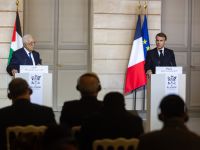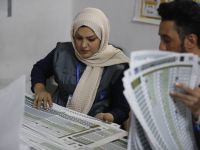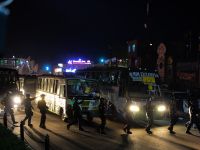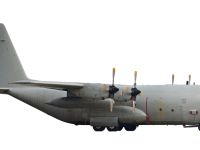By Nigel Thorpe
Head of the English Copy Desk
Far from the smoky, rock strewn Palestinian streets, The Israelis are waging a second secret war.
This second offensive is being fought not with bullets, helicopter gun-ships, or tanks, but with the axe, curfews and bulldozers in the olive orchards of heartland Palestine.
Hidden from the eyes of the media, the agricultural war is just as deadly as the daily street confrontations that make the daily headlines and TV newscasts. According to Addameer Organization, which is based in Jerusalem, Israel's
"economic war aims at weakening the Palestinians financially, and exhausting their societal structure."
Israeli's agricultural and economic war plans are not, however, new but were hatched and implemented during the first Intifada by researcher Arieh Shalev of the Jaffe Center of Strategic Studies at Tel Aviv University. Shalev, a general reservist and a Labor Party supporter, was also military governor in the West Bank during the early seventies. His three deadly strategies were imposing curfews for months at a time, besieging villages and cities by severing transportation links, and preventing Palestinians from working either in Palestine or in Israel.
Now, during the second Intifada, "deorchardization" and harassment of olive farmers have been added to Shalev's deadly triad of strategies. Addameer, a Palestinian Prisoners' Support and Human Rights Association, based in Ramallah have chronicled these daily events in the occupied territories.
On October 24th, for example, Addameer reported that "at least 4 dunums (4,000 sq.m.) of olive orchards were bulldozed that afternoon near Netzarim Junction in Gaza, uprooting hundreds of olive trees. Olive orchards were also bulldozed in the village of Hossan, Bethlehem, Salfit, and Nablus, in addition to a banana plantation in Jericho." A day later, on October 25, "tens of dunums of olive trees were chopped down by Israeli settlers in Beit Furik, Qaryout and Burin. To date, hundreds of dunums of agricultural lands were bulldozed and confiscated in the Gaza Strip, an area which the Israelis have divided up into three isolated Palestinian regions."
On October 27, villages in the Salfit area were completely isolated from one another and Israeli settlers joined soldiers in bulldozing agricultural lands and uprooting olive trees in the area. Farmers are also prevented from attempting to gather the olives from the uprooted trees, because the orchards were closed to all Palestinian residents.
Even in the villages where the Olive Orchards have not been destroyed, the Israeli occupation forces are making it impossible for Palestinian farmers to harvest their olives by a vicious combination of curfew and attacks by both Israeli army units and Israeli settlers. As of October 28, Huwarra was in its twenty-first, and Hebron in its twenty-eighth day of curfew making it impossible for their Palestinian inhabitants to farm the land. Also on October 28, the Israeli military fired tear gas into the olive orchards forcing farmers from the village of Jenin to leave and return home, while in Hebron, the Israeli achieved the same objective by firing shots injuring at least one villager as they sealed off the olive orchards.
Particular vicious attacks by Jewish farmers have been reported almost daily. On 24th October, Huwarra residents were attacked by armed settlers while attempting to harvest their olives and one day later, there were many reports of Israeli settlers attacking olive farmers in the Bethlehem area.
In an attempt to defend their fragile livelihood, the Palestinians organized a campaign that began on Wednesday October 25th which mobilized volunteer mass labor to help the farmers harvest olive particularly in areas near Jewish settlements.
The timing of the Israeli attacks comes at a critical time when olives are being harvested six to eight months after they bloomed in the spring. To make the best oil, the olives should be harvested as they just change color from an unripe green to black. At this point, almost all the oil has been formed, and flavor of the olive is at its peak. Once collected, the olives must be rushed to the mills on the same day or, at most, the day after harvesting. Olives which are not pressed during this time window begin to oxidize and ferment. Curfews and attacks on farmers are clearly designed to sabotage the 2000 olive harvest and impoverish the Palestinian population. As noted by Adameer, "The destruction of olive crops holds serious economic ramifications for the majority of Palestinian villages whose main income depends on olives and olive products."
As graphically described by Wael Ahmed on his interesting web site
( http://www.cyberpalestine.org/Wael/shuqba/Shuqba.htm ), the destructive results of Israel's agricultural war can be seen with depressing clarity in Shuqba "the quintessential Palestinian village." After the town of Jericho (Ariha), Shuqba is considered to be the oldest village in Palestine dating back to approximately 8000 BC. The shinning white buildings of the postcard-perfect town are perched on the top of a low hill and framed by the dark bands of olives that used to fill Wadi al Zaytun (the Valley of Olives).
The destruction of the village's Palestinian heritage began during the 1948 war with the depopulation and "deforestation" of villages surrounding Shuqba. In Wael's own words "on October 14, 1953, a neighboring village, Qibya, was attacked by an Israeli military force led by Ariel Sharon. Upon arrival, it was surrounded and cordoned off from all the neighboring Palestinian villages. The attack began with concentrated, indiscriminate artillery fire on the homes in the village. This continued until the main force reached the outskirts of the village. Meanwhile, other forces headed for nearby Arab towns such as Shuqba, Badrus and Na'lin in order to distract them, and prevent any aid from reaching the people of Qibya. They also planted mines on various roads so as to isolate the village completely. As units of the Israeli infantry were attacking the village, units of military engineers were placing explosives around some of the houses and blowing them up with everyone inside them. Israel infantrymen fired at everyone who tried to escape."
"These brutal acts continued until 4.00 a.m., October 15, 1953, at which time the Israeli forces withdrew to their bases. There was a particular haunting memory for all of us who witnessed the massacre: an Arab woman sat on a pile of debris casting a forlorn look into the sky. From beneath the rubble one could see the small hands and legs which were the remains for her six children, while the bullet-maimed body of her husband lay in the road before her. This vicious terrorist attack resulted in the destruction of 56 houses, the village mosque, the village school and the water tank which provide the village with water. Ariel Sharon stated that his orders had been clear with regard to how the village resident's were to be dealt with. He said, "the orders were utterly clear: Qibya was to be an example to everyone."
Unfortunately, Israeli has made Qibya "an example to everyone" many times more since those dark days in 1953. In 1980, "Wael's family lost a large tract of land they used for planting cash crops and today, any villager who enters is likely to be shot on by Israeli soldiers posted nearby. About one third of Shuqba's inhabitants fled to Jordan during the 1967 war.
Several Israeli settlements and access roads, which are illegal under international law, have been built around Shuqba. In September 1997, over 300 olive trees belonging to Shuqba were uprooted to make way for a settlers' bypass road. In 1999, more land was confiscated near the main entrance to the village. Wael's orchard, which has been in his family for many generations is, in his own words, "in danger of being confiscated by the Israelis. Most of the villagers are farmers or laborers. Those who farm raise livestock, cereal grains, or vegetables and most families harvest olives, figs, cactus pears, in the late summer and fall. As the cost of feeding livestock soars, and more land is confiscated, economic self-sufficiency is on the decline, and most villages are forced to turn to work in Israel or, ironically in Israeli settlements."
Israeli's nearly 50 year-old depopulation policy has certainly been highly effective in Shuqba and many other Palestine villages. Thousands of "Shuqbans", including Wael, have scattered to the four corners of the world including the United States and many other Arab countries including Jordan, Kuwait, Egypt, Saudi Arabia.
Most "Shuqbans", left their home village to save their lives, and to find the kind of freedom that in President Clinton's own words " is the natural aspiration of people all over the world." The president should, perhaps, have added the words "all over the world except in the killing orchards of Palestine.”
Ironically, the olive is the symbol of peace, health, wealth and happiness to the three great monotheistic religions (Islam, Christianity and Judaism) that hold Jerusalem to be sacred. The destruction of the traditional olive orchards, unseen by CNN cameras, is now the sad symbol of war, death, and servitude.
The recent condemnation of Palestinian aspirations by the U.S. Congress has highlighted again the fact that Washington insists that Palestine accept the Camp David style of "Pax Americana" which would replace the historically odious Pax Romana and the "Pax Britannica" experienced by the region generations ago. If Palestine accepts the new "Pax Americana", they may indeed gain statehood but this will be at the price of entering generations more of serfdom. This is surely a price that "everybody in the world", including Palestinians, would not be prepared to pay.
© 2000 Al Bawaba (www.albawaba.com)







